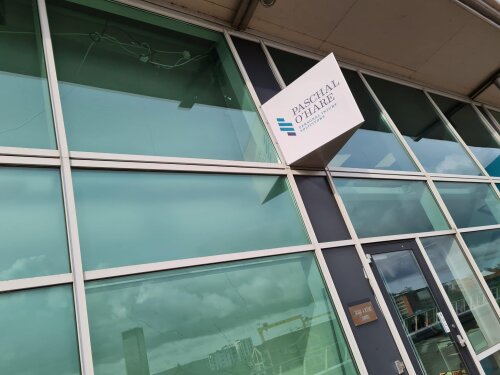Best Work Injury Lawyers in Belfast
Share your needs with us, get contacted by law firms.
Free. Takes 2 min.
List of the best lawyers in Belfast, United Kingdom
About Work Injury Law in Belfast, United Kingdom
Work injury law in Belfast covers legal rights and remedies for people who are injured, become ill, or suffer loss because of their work. The legal framework combines statutory duties on employers to provide safe workplaces, procedures for reporting and enforcing safety standards, rules about claiming compensation through the civil courts, and access to statutory benefits. Common claims include accidents at work, occupational disease claims, and claims by dependants after fatal incidents. In Belfast the same broad principles that apply across the United Kingdom are in force, alongside Northern Ireland specific regulators and enforcement arrangements.
Why You May Need a Lawyer
Many workplace injury matters can be straightforward, but a lawyer can be essential when any of the following apply:
- Your employer or an insurer disputes liability for your injury.
- You sustained a serious or permanent injury, including loss of earnings or long term care needs.
- You have an occupational disease where causation and exposure are complex or occurred over many years.
- There is a fatality and dependants wish to bring a claim for loss of dependency.
- You face short deadlines, complicated limitation rules, or cross-jurisdictional issues.
- You need help valuing future losses, negotiating a fair settlement, or dealing with medical experts and legal costs.
- You have employment law elements such as dismissal, discrimination, or detriment connected to your injury.
Local Laws Overview
Key legal and regulatory points to bear in mind in Belfast and Northern Ireland include:
- Employer duties - Employers must take reasonable steps to protect workers from injury and ill health. These duties arise from workplace safety legislation and common law duties of care.
- Health and safety enforcement - The Health and Safety Executive for Northern Ireland enforces safety standards and can investigate workplaces, issue notices, and bring prosecutions for serious breaches.
- Reporting obligations - Employers must report certain workplace injuries, diseases, and dangerous occurrences to the appropriate authority under the local reporting regulations.
- Employer liability insurance - Employers are generally required to hold insurance that covers liability for workplace injuries. This insurance is often the source of compensation when a claim is successful.
- Limitation periods - In most personal injury claims the limitation period is strict. You will commonly have three years from the date of injury, or from the date you knew the injury was caused by work, to start a civil claim. There are special rules for children, deceased persons and latent occupational diseases, so getting early advice is important.
- Statutory benefits - A range of statutory payments and benefits may be available, including statutory sick pay, disability-related benefits and, in some cases, industrial injuries benefits. These provide financial support while a claim proceeds but do not replace a compensation claim for negligence.
- Civil claims - Compensation claims for negligence or breach of statutory duty are normally brought in the civil courts. Cases can involve evidence from medical experts, occupational experts and detailed financial calculations for loss of earnings and future care.
Frequently Asked Questions
Who can bring a work injury claim?
Anyone who has suffered injury or illness caused by an employer, a co-worker, or another party at work can potentially bring a claim. Dependants may bring a claim if a loved one has died because of a workplace incident. Eligibility can depend on employment status and the facts of the incident, so an early review by a lawyer or advice agency is helpful.
How long do I have to make a claim?
Time limits vary with the type of claim. For most personal injury claims you will usually have three years from the date of injury or from the date you knew the injury was work related. There are different rules for children, for claimants who lack capacity, for fatal claims, and for diseases with delayed onset. Seek advice promptly to preserve your rights.
Do I need to report the incident to my employer?
Yes. You should report the incident to your employer as soon as possible and ensure it is recorded in the workplace accident book or the employer’s incident reporting system. A formal written report helps to create a record that will support any later claim. If the employer refuses to record the incident, make and keep your own written note of events and witnesses.
What types of compensation can I recover?
Compensation can include damages for pain, suffering and loss of amenity, past and future loss of earnings, medical treatment and rehabilitation costs, care needs, and special expenses related to the injury. Each claim is assessed on its own facts and supported by medical and financial evidence.
What if my employer says the injury was my fault?
If you are partly to blame, you may still be able to recover damages. The court can reduce an award to reflect your share of responsibility - this is called contributory negligence. A lawyer can advise on how likely it is that your contribution will affect the value of your claim.
Can I use a no win no fee agreement?
Many solicitors offer conditional fee arrangements that allow a claim to proceed without up-front fees. The terms vary and may involve a success fee or a percentage of the settlement. Always get the fee agreement in writing and make sure you understand any costs you might be responsible for if the claim is not successful.
Will legal aid pay for my work injury claim?
Legal aid for personal injury claims is very limited. It is not commonly available for workplace injury claims that are privately funded, although there may be exceptions in specific circumstances. Law firms and advice organisations can help explain funding options.
What evidence do I need to support a claim?
Useful evidence includes medical records, accident reports, witness statements, photographs of the scene or injuries, payslips, employment records, and any correspondence with your employer or insurers. Early collection and preservation of evidence is important, particularly in cases involving defective equipment or hazardous conditions.
How long will a claim take?
Timescales vary widely. Some claims settle within months if liability is admitted and the injuries are straightforward. Complex cases that require expert evidence or go to court can take a year or more. Your lawyer should give you an estimated timeline after reviewing the case.
What should I avoid doing after a workplace injury?
Do not sign any documents or accept an early settlement offer without legal advice. Avoid posting detailed comments about the accident on social media. Do not delay seeking medical treatment, and do not destroy or alter evidence related to the incident. Early professional advice will help protect your rights.
Additional Resources
Consider contacting or consulting the following organisations for assistance and information:
- Health and Safety Executive for Northern Ireland - the regulator responsible for workplace safety and investigations.
- Northern Ireland Courts and Tribunals Service - for information about court procedures and filing claims.
- Law Society of Northern Ireland - for help finding a solicitor who specialises in personal injury and employer liability work.
- Citizens Advice - for free initial advice on rights, benefits and practical steps after an injury.
- Department for Work and Pensions and local benefits authorities - for information on statutory benefits and entitlements.
- Trade unions and workplace safety representatives - they can provide practical support, representation and workplace records.
- Your GP and local occupational health services - for medical assessment, treatment and records that support any claim.
Next Steps
If you have been injured at work in Belfast, use this practical checklist to protect your position and to prepare for possible legal action:
- Seek immediate medical attention and follow the treatment plan. Make sure the injury is recorded in medical notes.
- Report the incident to your employer and make sure it is formally recorded. Keep a copy of any report and your own written account of events.
- Preserve evidence - take photos, keep damaged equipment if safe to do so, note witness names and contact details, and retain payslips and employment records.
- Contact a solicitor who specialises in workplace injury or seek initial advice from Citizens Advice. Ask about fees, success rates, and likely timescales.
- Consider notifying your employer’s insurer and ask whether interim payments are available if you face immediate financial hardship.
- Keep a diary of symptoms, appointments and the financial impact of the injury, including travel costs and loss of earnings.
- Do not accept offers, sign releases, or give recorded statements without legal advice.
- If you believe there is an ongoing safety risk, report it to the relevant regulator so it can investigate and prevent future harm.
Early, practical steps and timely legal advice will increase the chances of a successful outcome. If you are unsure where to start, obtain an initial case evaluation from a solicitor or an accredited advice agency to discuss the specifics of your situation.
Lawzana helps you find the best lawyers and law firms in Belfast through a curated and pre-screened list of qualified legal professionals. Our platform offers rankings and detailed profiles of attorneys and law firms, allowing you to compare based on practice areas, including Work Injury, experience, and client feedback.
Each profile includes a description of the firm's areas of practice, client reviews, team members and partners, year of establishment, spoken languages, office locations, contact information, social media presence, and any published articles or resources. Most firms on our platform speak English and are experienced in both local and international legal matters.
Get a quote from top-rated law firms in Belfast, United Kingdom — quickly, securely, and without unnecessary hassle.
Disclaimer:
The information provided on this page is for general informational purposes only and does not constitute legal advice. While we strive to ensure the accuracy and relevance of the content, legal information may change over time, and interpretations of the law can vary. You should always consult with a qualified legal professional for advice specific to your situation.
We disclaim all liability for actions taken or not taken based on the content of this page. If you believe any information is incorrect or outdated, please contact us, and we will review and update it where appropriate.














